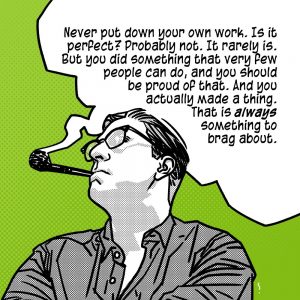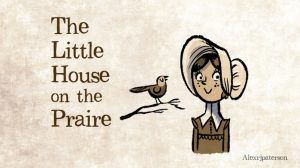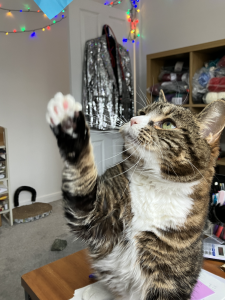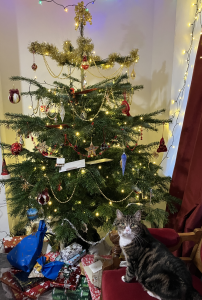Plus great advice from Matthew Dow Smith, a fun thread from Alex Paterson, Hugos eligibility furore and hopefully the last update on Grabbity’s poorly eyes.
Hi there,
The next Grist webinar will take place on Thursday 8 February at 19:00 GMT, and we’ll be taking a look at Plan Continuation Bias and how you can use that, and other cognitive biases, to help your characters make a jolly old mess of whatever it is they are trying to do. Stay tuned for the Zoom link, which will be sent out to paid subscribers soon!
Opportunity: RLF Fellowship
The Royal Literary Fund is looking for professional writers “with at least two (sole-authored) books published, or professionally produced theatre works performed, or radio/TV scripts broadcast” to work with university students across the UK. Fellows will be available for students two days a week, with an extra half day for admin, prep etc, for 30 weeks, and will be paid £16,000 per year.
The aim of the Fellowships is to “foster good writing practice among students through one-to-one coaching” and develop “student writing skills/academic literacy (rather than on creative self-expression as with the conventional writer’s residency)”.
Read this: The Gathering of the Ghosts
The New York Times has a fascinating piece about a ghostwriting conference that was held in NYC earlier in the month. Ghostwriting is booming, although when describing the state of the industry, ghostwriting agent Madeleine Morel said, “I’ll paraphrase Dickens: It’s the best of times and the worst of times. It’s the best of times because there’s never been so much work out there. It’s the worst of times because it’s become so competitive.”
I have to admit, last year I did think about trying to get into ghostwriting, but it seems like a challenging industry to break into. If you’ve experience with ghostwriting, leave a comment and let us know how you got into it!
Tip-top tip: Be proud
Love this little bit of advice from Matthew Dow Smith on Bluesky and Instagram:
Tweet of the week fortnight
Illustrator Alex Paterson is reading Little House on the Prairie with his daughter and decided to illustrate some of the more, uh, interesting incidents described in the book.
On the perennial matter of “we see” and “we hear”
I’m in a few screenwriting Facebook groups, which are almost all completely useless being mostly unproduced writers telling other unproduced writers how to write. One of the things that comes up again and again is whether the phrases “we see” and “we hear” are Against The Rules, or whether, in fact, no one actually cares.
The latest instalment in this long-running drama comes from Reddit, where user Prince Jellyfish decided to take a look at a bunch of award-nominated scripts to see how many of them used “we see” or “we hear”. It probably won’t surprise you to hear that 53 of them did, in fact, use these verboten phrases. Only one did not, and that one was written largely in French.
It seems that, in reality, no one does care.
Cue a lot of unproduced writers telling each other that actually these screenwriters have Broken In, ergo can do what they want and therefore Don’t Count, which is an argument that makes absolutely no sense whatsoever.
Prince Jellyfish also linked to a post by Manfred Lopez Grem, who runs through a list of ways that “we see” can be used to great effect, and who also points out that “Nearly Every Single Screenplay that is up for awards consideration in 2022 / 2023… uses ‘we see.’”
Case closed, you’d think, but this argument is like ones about how to cook steak or whether bicycle helmets work – it’ll never, ever end.
Read this: The Hugos’ eligibility furore
Last year, the science fiction convention WorldCon and the associated Hugo awards were held in Chengdu, China. But a week or so ago, voting totals for the Hugos were released, revealing some strange exclusions. The Guardian’s Amy Hawkins writes:
Recently released documents showed that several works or authors – some with links to China – had been excluded from the ballot despite receiving enough nominations to be included on their respective shortlists. The excluded nominees include Kuang and Xiran, authors who were born in China but are now based in the west.
Concerns have been raised that the authors were targeted for political reasons, connected to the fact that the ruling Chinese Communist party exerts a tight control on all cultural events that take place inside its borders.
No satisfactory explanations have been forthcoming from Dave McCarty, head of the 2023 Hugo awards jury, as to exactly why these and other works were excluded.
However, the next Worldcon will be held in Glasgow in August, and both it and the Hugos are being organised by a different groups of people, who released a reassuring Bluesky thread about their plans for making sure that this year’s Hugos are administered transparently.
Stop, look, listen: The Rest Is Entertainment
I generally shy away from celebrity-led podcasts, but Marina Hyde and Richard Osman’s new podcast, The Rest Is Entertainment, is a really great listen. From how game shows manage their prize money budget to the phone hacking scandal, as well as insights into Richard’s book writing progress, they cover a lot of topics using their years of industry experience to provide insights into why TV, publishing and entertainment works the way it does.
Obligatory cat picture
Hopefully this will be the final Grabbity eye update for a while! After the last newsletter, and a few days after we stopped the steroid drops, Grabbity’s left eye started weeping badly and she was holding it shut, so back to the vet we went. It turned out that she had another corneal ulcer, in a totally different place! It was really quite large, but already showing signs of healing, so we got some antibiotic ointment and went back last Friday to find that it had completely healed. Just a few more days of ointment, then we stop treatment again and hope that this is the end of it all.
Poor Grabbity! It’s been seven months of me faffing with her eyes every day and although she gets treats every time I don’t think that has made up for the discomfort. She has chonked up a little bit too, so I’m going to have to put her on a bit of a diet soon. Maybe after a break, though, so that she can enjoy a little bit of normality first!
Right, that’s it for this week!
All the best,
Suw
{ Comments on this entry are closed }











